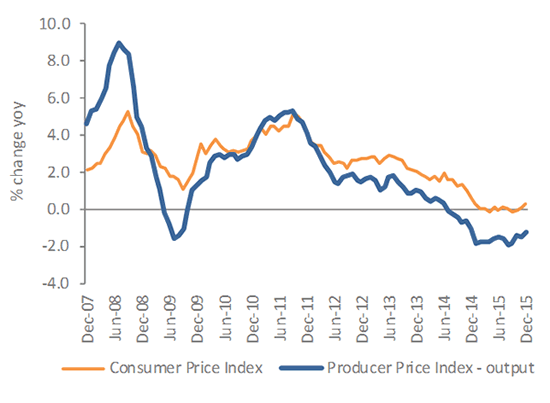Inflation rises above 0.1 per cent for the first time in 12 months
The Consumer Price Index (CPI) was positive for a second month in December with prices rising 0.2 per cent, year-on-year – in line with consensus expectations. This is the first month since January 2015 for which the rate has exceeded 0.1 per cent. Movements in transport costs, particularly air fares and to a lesser extent motor fuels, were the main contributors to the rise in the rate. Downward pressures from prices for alcohol and tobacco along with food and non-alcoholic beverages partially offset the rise. Deflation across Food and Non-Alcoholic Beverages deepened to -2.9 per cent in December as the supermarket price war intensified over Christmas.The Producer Price Index for output (PPI), which is indicative of costs faced by retailers, showed factory gate prices falling by -1.2 per cent in December - the weakest fall this year.
Costs facing retailers continue to decline
Source: ONSThe combination of oil prices falling to below $30 per barrel, the continued slow-down in China (now the slowest growth since 1990) and depreciation of the renminbi (which has fallen 2.7 per cent against the dollar in the last 6 weeks) will support cheaper imports in the coming months. However, there were even sharper falls in petrol and food this time last year and so this impact will soon drop out of annual comparisons. Despite a return to inflation, the outlook remains weak. Sharp falls in the price of oil last year will begin to fall out of annual comparisons, meaning inflation will begin to creep back up, but the pace is expected to remain slow. The path for inflation back to the Bank’s target of 2 per cent is expected to be long and protracted. The Bank’s current forecast suggests the 2 per cent target will be reached in approximately two years. We do not expect inflation to reach 1 per cent until the end of 2016 in our central forecast. Assuming there are no shocks to commodity prices, CPI is expected to remain below zero and 1 for the main part of 2016, reflecting the continued drag from commodity and other imported goods prices. On balance, we believe that this is a continuation of good news for the Bank of England. Inflation does not show any signs of rising sharply. This will give the Bank the opportunity to keep to its plan of a gradual rise in interest rates. The Monetary Policy Committee (MPC) judges that it is likely that interest rates will follow a very gradual and rising path implied by market yields. It’s estimated that a rise in interest rates takes 18-24 months to fully filter through the economy. Therefore, the first rate is expected to occur in mid-2016.
Back to Retail Economic News